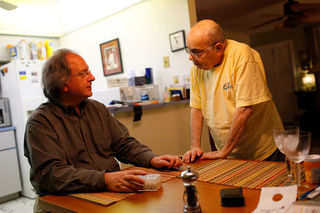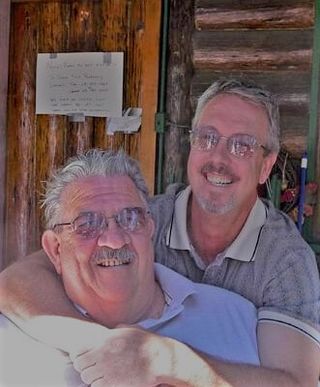Mating
The Curse of an Attraction to Older Gay Men
Daddy issues, money, or perfectly natural?
Posted October 12, 2018 Reviewed by Lybi Ma
Thomas Gass, a dentist in California, has survived the curse—twice. The curse? Gass is a gay man whose only sexual attraction is to men significantly older than he is.
Gass lost his first partner, 28 years his senior, through the slowly deteriorating effects of Lou Gehrig’s disease after they had been together for 13 years. After recovering from his grief, he found love again with a man 18 years older but endured another tragic loss when his second partner died of pancreatic cancer after they had spent 17 years together. Still a relatively young man, Gass might wonder whether or not to take a chance on loving an older man again. For him, however, the choice is between an older man or no man at all. Gass and his friends—all of whom had lost older life partners—have labeled their abiding sexual attraction “the curse of being attracted to older men.”
I began to study same-sex relationships with age disparities while conducting research for my book, Finally Out: Letting Go of Living Straight. Gass and I started to correspond after he and his friends had read and discussed my essay, “Age as a Factor in Sexual Orientation and Attraction.” He wrote that in their discussion, some common themes emerged:

1. The younger men have more interest in sports than their partners and their gay peers who are attracted to men their own age.
2. The younger men tend to be more masculine than their gay peers who are attracted to men their own age.
3. The younger men prefer older men with endomorphic bodies (belly fat, strong bones, and sturdy thighs).
While these observations are purely anecdotal and subjective, the comments resonated with some of my own observations. I would add another:
4. The younger man has a high need to please others.
A young man once said to me, “I like men with rounded corners; they have all their sharp edges worn off.” It struck me as being true, both literally and metaphorically. Another younger man commented, “I like a man with a bit of a belly so I have somewhere to lay my head.” This parallels the same fascination that many heterosexual men have for women's breasts. The younger men I interviewed seemed drawn to men freed from the tyranny of testosterone, expressing their greater attraction to wisdom, stability, commitment, experience, and maturity.

Gass went on to say that these relationships are often misunderstood, perhaps especially by the LGBTQ community. He wrote, “I struggle more to explain my attraction to older gay men to my gay friends than I do to my straight friends.” It's difficult to explain when you don't understand it yourself.
What defines “age disparity in relationships”? An old rule of thumb of unknown origins prescribes, “Never date anyone less than half your age plus seven.” No one has collected reliable statistics, but age disparity seems to occur more frequently in gay relationships than in heterosexual ones.
In 2016, the New York Times published an opinion piece by former Pennsylvania Senator Harris Wofford, who at 90 years old was planning to marry Matthew Charlton, his 40-year-old lover, whom he had been together with for 15 years. Senator Wofford had spent nearly half a century married to his wife, Clare, who died when they were both almost 70. Writing about Matthew, Wofford said, “To some, our bond is entirely natural, to others it comes as a strange surprise,” and this tension is reflected in the comments posted about the essay. The most common sentiment was “OMG,” with a running theme of “There’s no fool like an old fool.”
While a 50-year age difference is an outlier, other well-known May-December couples have captured the public’s attention: the late neurologist and author Oliver Sacks, M.D., and writer Bill Hayes (27-year difference in age), British-American author Christopher Isherwood and Don Bachardy (30-year difference), and British actor Stephen Fry and Elliot Spencer (30-year difference). Various derogatory labels are used to describe such couples: sugar daddy, gold digger, trophy husband, or boy-toy. But in the case of a celebrity, the tabloid headlines these labels may be used in sensationalistic ways, or even include more virulently homophobic names like pedophile and predatory pervert.
Although atypical, are these relationships abnormal? Senator Wofford wrote that although some people are skeptical about his relationship, “most soon see the strength of our feelings and our devotion to each other.”

For the younger partner, one characteristic of “the curse” is that these relationships often end too soon. In many cases, the relationship involves dedicated caregiving, as so poignantly described in “In Sickness and in Health: A Couple’s Final Journey,” a Pulitzer Prize-winning story about Chris MacLellan’s caring for his partner, Richard Schiffer (26-year difference,) who died slowly of esophageal cancer. Although one comment on Senator Wofford’s essay said about the younger partner, “He opted for custodial work with a senior citizen,” many of these younger men put their own lives on hold to become heavily invested caregivers that heterosexual couples can only envy.
Another part of the curse, though, is the prejudice and misunderstanding that these couples face, often receiving their greatest criticism from members of their own LGBTQ community. (Even the older partner initially may doubt the seriousness of the younger man's interest.) According to Gass, the most tiresome rationalization is that “the only logical explanation is money.” Or less delicately, “Is it romance or adoption?” Comments about money are often central—for example, a way to inherit untaxed assets or the need for a good prenup for the children’s sake. In fact, however, many of the younger men are more independent and financially secure than their older partners, and they resent the implications that surround their motivations. Another part of the curse is that these relationships are endlessly analyzed for “daddy issues.”
The older man, particularly if he was in a heterosexual marriage previously and came out later in life, is apt to hear, “You must have spent many years cruising and picking up men behind your wife’s back,” or “You couldn’t possibly have loved your wife sexually.” While true for some, it is definitely not true for all. When the older man has children—sometimes older than his partner—many incorrectly doubt that the couple will be accepted by family members, predicting family discord on a staggering level.

Another frequent characteristic of the curse is the belief that the relationship can’t be based on passion, that the only old men who think about sex are “dirty old men.” I was once asked by a young gay man, “Why did you come out at 40? You’re too old for sex.” In fact, most men can remain sexually active well into late life, although men's sexual functioning changes over time. But these gay couples may be far more sexually active than many same-sex couples.
Some people assume that infidelity is a given because their sexual interests can’t be equal—as if heterosexual couples always have evenly balanced sexual interests. It has been suggested that satisfying sex cannot occur without wet kisses and swelling organs, which reduces gay sexuality to nothing more than sex, and it implies that older men are incapable of having erections. But sex that has both emotional and physical intimacy and when it is expressed in slow time, it may be far more satisfying. No age cutoff exists for exciting, interesting, and satisfying sex.
One recurring question remains: “How can a man have a mutually satisfying sex life with a wife and then have a sudden revelation that he’s gay? Doesn’t this contradict the idea that gay people are ‘born this way’?” It can be confusing, even for those of us who’ve experienced it, but the mind has a powerful capacity not to see what it doesn't want to or isn't ready to perceive. I don’t believe we have a choice about our sexual attractions, but gay men and women—just as any heterosexual person—have a choice about how they respond to sexual desire. Behavior and identity are not the same things; they are not consistent from one person to the next or sometimes even within the same individual.
How we express our sexuality depends on many variables, including socialization, culture, religion, geography, and psychological health. Sexuality is likely more fluid than once thought. Saying “I am gay” is a statement that our attractions, our behavior, and our self-identity are in unison, and when that happens—if it ever does—it suggests a willingness to proclaim our sexuality regardless of the consequences. It says, "I belong somewhere, and I am not alone."
We don’t know much about the origins of sexual attraction, but what we are just beginning to understand is that for some young men, attraction to older men is a constant part of their sexual attraction matrix, and it generally remains fixed no matter their age.1 What we can be certain of is that to consider money the basis of these relationships or to deny that they might have an erotic dimension degrades the people involved in them. Such beliefs are based on stereotypes. Sexual attraction isn’t rational, and to seek rational explanations for it diminishes the mystery and excitement of loving another.
References
1. Seto, M, "The Puzzle of Male Chronophilias," Archives of Sexual Behavior, Augsust 22, 2016 (copy obtained from author).




